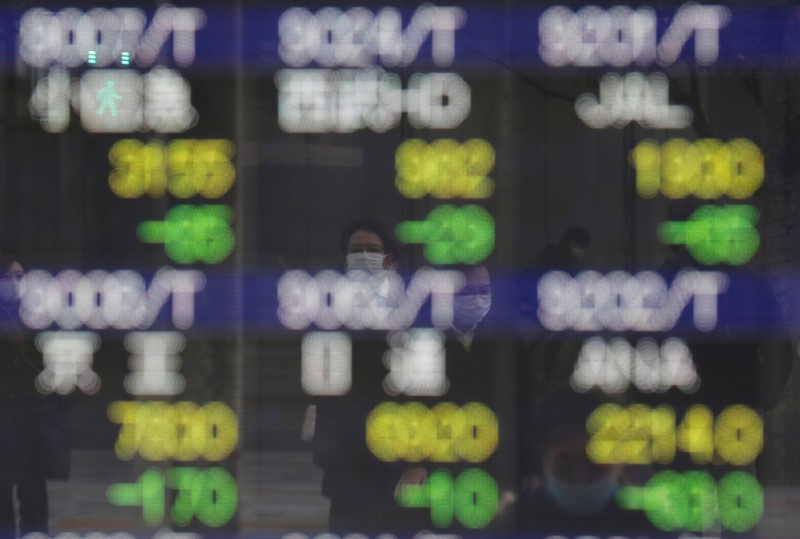By Hideyuki Sano
TOKYO (Reuters) - A sudden spike in inflation expectations priced into Japanese government bonds shows some investors are changing long-held assumptions about the economy being resistant to any global supply-side shocks.
Growing concerns about global inflation, fuelled by rising commodity prices and a supply crunch worldwide, have prompted investors to buy Japanese inflation-linked bonds, driving the 10-year breakeven inflation (BEI) rate higher last week.
While investors appear confident in the Bank of Japan's ability to anchor bond yields, the rare jump in inflation expectations to 2018 levels speaks to how the pandemic is changing perceptions about price pressures in a country beset by decades of deflation.
"I feel there are many investors who are a bit too careless about inflation, thinking that won't happen in Japan even if the rest of the world is in inflation," said Tadashi Matsukawa, Japan head of fixed income investments in PineBridge Investments.
Matsukawa thinks consumers no longer view price hikes as unpalatable.
"People haven't gone out for drinking for such a long time. They may be more eager to pay for that now. If you think just because there has been deflation for so long, that will continue forever, you could be in for a nasty surprise."
The 10-year breakeven inflation (BEI) rate, the gap between inflation-linked bonds and conventional bonds, rose last week to 0.36%, meaning markets expect Japan's inflation over the next 10 years to average that much.
That compares with an inflation expectation of just 0.07% in mid-July and around 0% at the end of last year.
Since late 2020, the bond markets have also been pricing in inflation levels higher than the actual inflation rate.
(GRAPHIC: Japan inflation - https://fingfx.thomsonreuters.com/gfx/mkt/egvbkmnmnpq/211008B.png)
Japan's official consumer price inflation has so far shown little sign of price gains, with the annual core CPI turning flat in August after falling for a year.
Average inflation over the past 10 years, when stripping out the impact of two sales tax hikes, is about 0.1%.
With inflation nowhere near the Bank of Japan's 2% target, investors expect the central bank will stick to massive monetary stimulus for the foreseeable future.
COUNTING ON BOJ
To be sure, many market players say Japan's BEI rate should be taken with a grain of salt because the inflation-linked bond market is small, with limited players and illiquid trading.
The level of expected inflation is also a fraction of what is baked in elsewhere -- around 2.45% in the United States and 1.60% in Germany.
Yet, there are tentative signs that price pressures are building.
Hourly pay for contract workers rose 3.1% on an annual basis in August, the biggest increase since December 2019, amid signs of a labour shortage, data from staffing firm En Japan showed.
(GRAPHIC: Japan wage - revised - https://fingfx.thomsonreuters.com/gfx/mkt/dwvkragldpm/211008E.png)
Government data showed wages rose 0.7% in August, though economists say the data can be misleading because an increase in lower-paid jobs can weigh on overall wage growth.
Factors that once helped keep a lid on prices have also waned. Chinese labour and prices are not as cheap as they used to be.
Japanese companies have also been more reluctant to relocate production overseas amid supply chain uncertainty due to the COVID-19 pandemic and U.S.-China tensions.
Inflation worries helped drive the 10-year JGB yield to a four-month high of 0.085% on Monday, though investors see limited room for a further rise, confident in the BOJ's tight grip and policy intent to keep the yield close to 0%.

The risk is a spike in yields, should investors start to doubt the BOJ's commitment.
"Without the BOJ's policy peg, the 10-year JGB yield could easily rise to 1%," said Hiroaki Hayashi, managing director at Fukoku Capital Management.